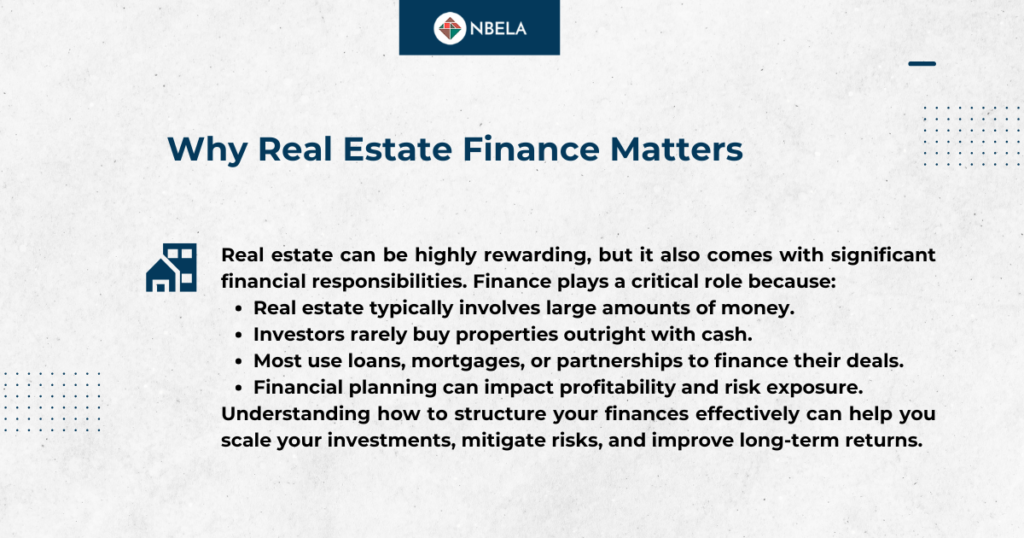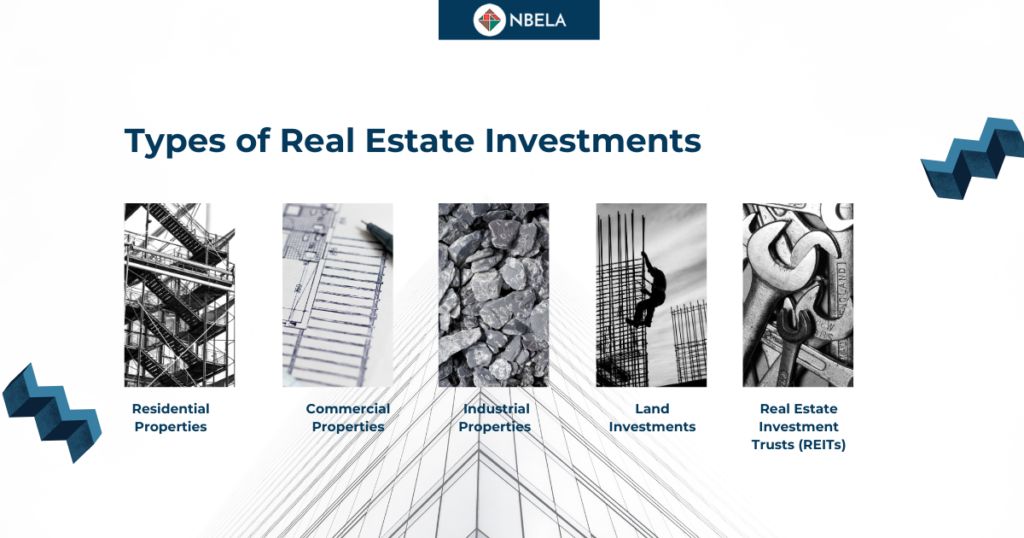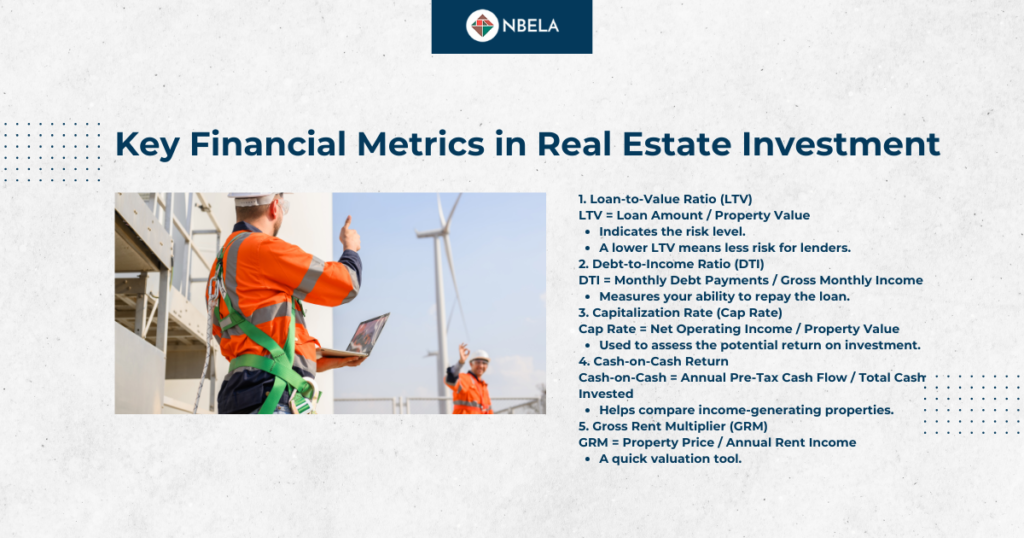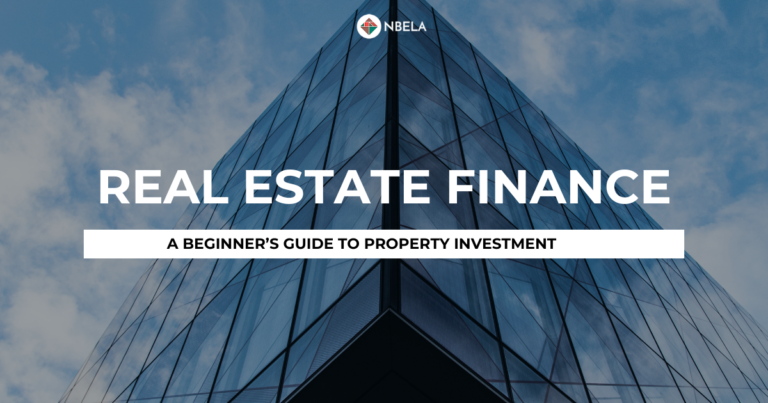Real estate finance is the backbone of property investment. It refers to the methods and tools used to fund real estate transactions, from purchasing a single-family home to investing in large commercial properties. For beginners, understanding the basic principles of real estate finance can be the key to making profitable investment decisions. This guide will explore everything from financing options and risk assessment to tips for successful investing.
Why Real Estate Finance Matters

Investing in real estate can be highly rewarding, but it also comes with significant financial responsibilities. Finance plays a critical role because:
- Real estate typically involves large amounts of money.
- Investors rarely buy properties outright with cash.
- Most use loans, mortgages, or partnerships to finance their deals.
- Financial planning can impact profitability and risk exposure.
Understanding how to structure your finances effectively can help you scale your investments, mitigate risks, and improve long-term returns.
Types of Real Estate Investments

Before diving into financing methods, it’s important to understand the various types of real estate investments:
1. Residential Properties
Includes single-family homes, apartments, and condos. These are ideal for beginners because they are easier to finance and manage.
2. Commercial Properties
Office buildings, retail stores, and shopping centers fall under this category. They usually require more capital but offer higher returns.
3. Industrial Properties
Warehouses, manufacturing plants, and distribution centers. Often leased to businesses on long-term contracts.
4. Land Investments
Vacant land that can be developed or held for future appreciation. Riskier due to market fluctuations and development costs.
5. Real Estate Investment Trusts (REITs)
Publicly traded companies that own and manage real estate portfolios. Great for investors who prefer passive income without direct property management.
Financing Options for Property Investment
1. Traditional Mortgages
- Fixed or variable interest rates.
- Ideal for residential properties.
- Requires a down payment and credit check.
2. FHA Loans
- Backed by the Federal Housing Administration.
- Designed for first-time buyers.
- Lower down payments but require mortgage insurance.
3. VA Loans
- For eligible veterans and active military.
- No down payment required.
- Backed by the Department of Veterans Affairs.
4. Hard Money Loans
- Short-term loans from private lenders.
- High interest rates and quick approval.
- Suitable for fix-and-flip investments.
5. Private Money Loans
- Borrowed from individuals instead of institutions.
- Terms are flexible and based on relationships.
6. Home Equity Line of Credit (HELOC)
- Borrow against the equity in your existing home.
- Revolving credit that can be reused.
7. Real Estate Crowdfunding
- Pool money with other investors.
- Invest in large properties with a small amount of capital.
Key Financial Metrics in Real Estate Investment

1. Loan-to-Value Ratio (LTV)
LTV = Loan Amount / Property Value
- Indicates the risk level.
- A lower LTV means less risk for lenders.
2. Debt-to-Income Ratio (DTI)
DTI = Monthly Debt Payments / Gross Monthly Income
- Measures your ability to repay the loan.
3. Capitalization Rate (Cap Rate)
Cap Rate = Net Operating Income / Property Value
- Used to assess the potential return on investment.
4. Cash-on-Cash Return
Cash-on-Cash = Annual Pre-Tax Cash Flow / Total Cash Invested
- Helps compare income-generating properties.
5. Gross Rent Multiplier (GRM)
GRM = Property Price / Annual Rent Income
- A quick valuation tool.
Building Your Real Estate Investment Strategy
1. Define Your Goals
Are you investing for passive income, appreciation, or diversification? Knowing your goals will shape your strategy.
2. Set a Budget
Determine how much capital you can invest and what loan amount you qualify for.
3. Choose Your Investment Type
Start with residential properties if you’re a beginner. Once experienced, you can branch into commercial or industrial investments.
4. Research the Market
Location matters. Study local real estate trends, rental demand, and economic growth.
5. Evaluate Properties
Use financial metrics to assess a property’s profitability.
6. Secure Financing
Choose the best loan option based on your financial situation and investment goals.
7. Property Management
Decide whether to manage properties yourself or hire a professional.
Risks in Real Estate Finance
1. Market Risk
Property values can fluctuate due to economic changes.
2. Liquidity Risk
Real estate is not easily converted into cash.
3. Interest Rate Risk
Rising rates can increase mortgage costs.
4. Tenant Risk
Vacancy or unreliable tenants can impact cash flow.
5. Legal Risk
Zoning issues, lawsuits, or regulatory changes can affect your investment.
Tips for First-Time Real Estate Investors
- Start small and scale gradually.
- Build a network of real estate professionals.
- Understand local laws and taxes.
- Create an emergency fund for unexpected repairs.
- Use real estate software for tracking expenses and performance.
Also Read : Mutual Funds Investment: A Beginner’s Guide To Building Wealth
Conclusion
Real estate finance is a powerful tool for building wealth and creating long-term financial stability. Whether you choose to invest in residential or commercial properties, the key to success lies in understanding your financing options, calculating risk, and building a solid strategy. With time, education, and smart decisions, beginners can transition into seasoned investors.
FAQs
What is real estate finance?
Real estate finance refers to the methods used to fund property investments, such as mortgages, loans, and other financial tools.
What is the best type of loan for beginners?
Traditional mortgages and FHA loans are ideal for beginners due to lower risk and structured repayment plans.
How do I calculate if a property is a good investment?
Use key metrics like Cap Rate, Cash-on-Cash Return, and Gross Rent Multiplier to assess profitability.
Can I invest in real estate with little money?
Yes. Options like real estate crowdfunding, partnerships, or using a HELOC can help you start with less capital.
Is real estate a safe investment?
While real estate can offer stable returns, it’s essential to understand the risks involved and perform due diligence on every deal.

